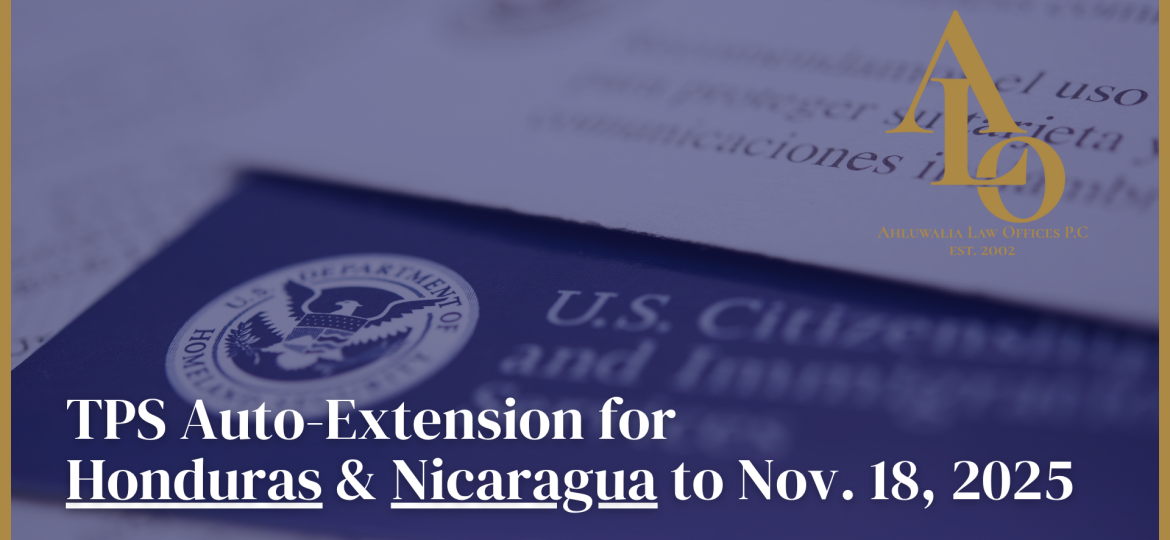
As of 20th August, 2025, this order has been stayed by 9th Circuit Court of Appeals. Please read update here.
On August 4, 2025, U.S. Citizenship and Immigration Services (USCIS) updated its guidance on Temporary Protected Status (TPS) for nationals of Honduras and Nicaragua, offering critical clarification on the validity of status and employment authorization through November 18, 2025. This update is particularly significant in light of the Department of Homeland Security’s (DHS) July 2025 announcement regarding the termination of TPS for these countries, originally set to take effect September 8, 2025.
What Has Changed?
Despite the DHS decision to end TPS designations for Honduras and Nicaragua, current TPS status and EADs (Employment Authorization Documents) are now automatically extended through November 18, 2025, as confirmed by USCIS.
This change allows both beneficiaries and employers to rely on this auto-extension for compliance and employment eligibility purposes, at least temporarily.
TPS History Snapshot:
| Country | Initial TPS Designation | Expiration Date (Pre-Update) | TPS Now Valid Through | EAD Auto-Extended To |
|---|---|---|---|---|
| Honduras | January 5, 1999 | July 5, 2025 / Sept. 8, 2025 | November 18, 2025 | November 18, 2025 |
| Nicaragua | January 5, 1999 | July 5, 2025 / Sept. 8, 2025 | November 18, 2025 | November 18, 2025 |
Source: USCIS TPS Honduras and USCIS TPS Nicaragua
Employer Responsibilities Under the Auto-Extension
Employers must ensure I-9 compliance using updated documentation guidance:
- Accept EADs with category codes A12 or C19 showing expiration dates that are now auto-extended to November 18, 2025.
- Reverify Forms I-9 accordingly and attach a printout of the USCIS website update to document reliance on official government sources.
- For employers using E-Verify, run Change of Status reports to update employee work authorization status.
- If previously terminated employees are now eligible under the auto-extension, they may be rehired.
Tip: Always download or print the official USCIS webpage as documentation for compliance audits.
What About the Termination?
- Federal Register Notice (July 8, 2025) confirmed TPS termination for Honduras and Nicaragua would take effect on September 8, 2025, 60 days after publication.
- However, under INA §244(d)(3), the failure to timely issue notice before July 5, 2025, results in a mandatory 6-month extension, pushing effective termination (if finalized) to January 5, 2026.
- TPS EADs expiring July 5, 2025 are automatically valid until January 5, 2026.
- For those who applied for EAD renewal during the designated period, work authorization may continue up to 540 days under the Form I-765 receipt rule, but not beyond January 5, 2026.
What Should Beneficiaries Do Now?
TPS holders from Honduras and Nicaragua should:
- Keep updated on USCIS and Federal Register publications.
- Retain copies of relevant USCIS web pages for personal records.
- Consult with experienced immigration counsel to explore alternative legal options, especially as TPS termination lawsuits proceed in court.
Litigation Update
A federal lawsuit filed by the National TPS Alliance and several plaintiffs is currently challenging the termination of TPS for Honduras, Nicaragua, and Nepal. While the litigation is pending, TPS holders maintain lawful presence and continued work authorization.
While this auto-extension is a temporary reprieve, TPS holders should prepare for long-term solutions. Our attorneys remain closely engaged with policy changes, pending litigation, and client advocacy. Whether you’re a TPS beneficiary or an employer seeking clarity, we are here to guide you with precision and strategy.


